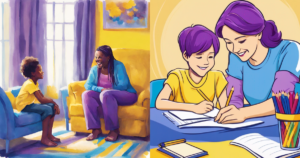One of the things I do believe we can all agree on is that the last four plus years have been quite the rollercoaster ride especially for us parents and our school-aged children.
These times we are living in have only increased the importance of encouraging our children to ask for help when in need, which can be considered a protective factor and positive influence in their lives.
Over the last several years, I have been running a youth-focused substance abuse prevention, mental health and overall wellness nonprofit that is research-driven and evidenced-based. Every year or two, since 2005, the Birmingham Bloomfield Community Coalition surveys anywhere from 3,500 – 7,500 7th – 12th grade students to gain a better understanding of underage substance use and mental health issues.
One of the areas we ask about on the student survey, in three different ways, is “If you found yourself needing help related to: 1. Mental health, 2.substance use, and 3. bullying, who would you go to?
The vast majority of the tweens and teens would go to their parent, friend or family member, which is great if the person is actually equipped to be of help and support (This will be another blog topic in the future).
The tweens and teens who are at the greatest risk are those who did not know who they would go to – or – would go to no one.
So, why is this an especially risky situation for them to be in?
Generally, when someone is in a situation where they are in need of help with mental health, substance use and/or bullying, their stress level is also high which could potentially kick them into a “fright/flight/freeze” situation. If a plan isn’t already in place of who they would go to, that their still developing brain can access, (their brains are not fully developed until about age 25), the likelihood of making a good decision is dramatically decreased.
This is but one reason why it is important to encourage your children to ask for help. And the younger this practice is started and encouraged, the more likely it will be continued during the tween and teen years when they become so much more self-conscious of themselves and what others think of them (which inhibits even the most simple questions from being asked).
Let your child(ren) know that “It’s okay to ask for help.” And, when they do, thank them for doing so. Depending on the situation, even acknowledge the courage it took to do so.
Encourage your children to ask for help when needed. This can be asking a teacher for help understanding a lesson, which so many tweens and teens feel uncomfortable doing, for whatever reason, to asking you how to do something, or even asking how to best support a friend in need.
Let them know that reaching out to trusted adults, such as teachers, counselors, or family friends, is a sign of strength and not a sign of weakness.
Find out who your child would go to? And, if they say “I don’t know,” ask if they would like your help in coming up with someone. If they go to a school, find out if there are any adults, they feel comfortable with?
Teachers seem like an obvious pick however they have a lot of students so it can be intimidating for the more introverted child.
Consider not so obvious adults at the school, such as the administrative assistants. Or think of adults at your place of faith, sports teams, other extracurricular activities, etc.
Let your children know or have them see you asking for help and being okay with it. The more this can be normalized as a positive trait, the more likely they will adopt it.
And, you can also be that trusted, safe, caring adult for your children’s friends. It truly does “take a village” to raise our children and help them navigate through uncertain times.











